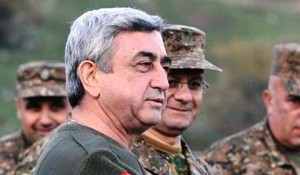 Turkey, which has been trying to preserve its power in the international arena by relying on the support of its Western allies, is currently suffering from serious backlash. Our politicians, who are unable to realize the growing resentment towards Turkey in the West due to domestic political considerations, continue to make bold and optimistic statements.
Turkey, which has been trying to preserve its power in the international arena by relying on the support of its Western allies, is currently suffering from serious backlash. Our politicians, who are unable to realize the growing resentment towards Turkey in the West due to domestic political considerations, continue to make bold and optimistic statements.
The Armenian diaspora, launching an effective campaign to push Turkey into a corner, now puts pressure on certain lobbying firms. These firms, which have made a lot of money working for Turkey for many years, are not only subject to strong propaganda; the diaspora also asks the huge firms to impose boycotts on Turkey. And it has been successful so far.
Gephardt Group is one of the lobbying firms that recently faced a boycott. Diaspora sources indicate that the lobbying firm, which receives $1.4 million every year, is now facing huge pressure after recent calls for boycotts.
The diaspora sources disclosed documents showing the lobbying company’s work in favor of Turkey in Washington; they publicize details about this work, describing it as “dirty business.” They are disclosing the details on which American politicians they talked to, the amount of money they spend on their travels to Turkey and on the possible partnerships in the states. It seems that the diaspora will disclose some additional information on other lobbying firms and their activities.
The diaspora’s activities on Turkey are not limited to the 1915 campaign. The diaspora also places emphasis on Turkey’s denial of historical developments, and, in addition, they also argue that Turkey has been supporting radical groups in Syria and that it fails to return Armenian properties to their original owners. These activities, I could say, are just a start; through these activities, the diaspora seeks to push Turkey into a corner and to threaten unofficial Turkish supporters in the US. American executives who attend a promotional event for Turkish culture may be accused of being manipulated by Turkey’s “dirty politics.”
A recent incident in February was unsettling for the Americans. The American Armenian National Committee strongly reacted to a promotional poster featuring Turkish women in folkloric attire and the Turkish flag in a famous coffee shop in Los Angeles; the shop removed the flag after the strong reaction. A strong message was delivered to the Turks and their supporters. In addition, this proved that the lobbying firms, despite receiving large sums of money from the diaspora, did not do their jobs well. The heated discussions often accompanied by hate discourse exacerbated the tension between the Turks and the Armenians. One of the discussions on the matter was about whether the Jews would respond if a German flag had been exhibited. The diaspora’s activities include holding popular events with the participation of celebrities in an attempt to draw attention to April 24, giving rewards and involving Armenia in these activities. For instance, movie star George Clooney is already presented as a key advocate for the recognition of the genocide events.
Armenia, which no longer cares about the diaspora and the protocols, does not maintain relations with Turkey; Turkey, on the other hand, is unable to identify who to talk to in an attempt to refresh its image with bold campaigns against lobbying activities. Turkey’s ambivalence in this matter is understandable because some of the politicians in Yerevan are former criminals who committed war crimes in Nagorno-Karabakh in the 1990s; this obstructs any attempts of dialogue on the events of 1915. The diaspora focuses on the events of 1915 and fails to recognize Karabakh and the terrorist Armenian Secret Army for the Liberation of Armenia (ASALA), and this shows that it is not sincere about addressing crimes against humanity.
The approach of a government or political actor that argues that the Treaties of Gimri and Moscow were concluded by past governments and are thus not valid today, that ASALA was a matter of the past in the Soviet era, that the massacres in Karabakh were part of the liberation of those lands and, for this reason, deaths were normal in that war, cannot be seen as sincere in its cause of dealing with the 1915 pains. We need to focus on historical facts to measure this sincerity. For instance, we are unable to appreciate the constructive approach of some figures, including first Prime Minister of Armenia Hovhannes Kcaznuni, who in 1918 admitted the crimes and errors of the Armenian side in this environment of disinformation. We also see that the diaspora, despite arguing that it is working to ensure that crimes against humanity will not be committed again, remains silent on massacres and genocides in the recent past.
Of course, arguing that our people were also killed is not a good approach for Turkey as well, and this is not sincere. In addition, praising the governments of the past and ignoring their sins are also insincere. The same is done by the Armenians who praise the Dashnak leaders and those who committed massacres in Karabakh. So we realize that both sides have the capacity to rely on the same methods for further hostility. However, despite their similarity in many respects, the parties do not make efforts for reconciliation.
Mehmet Fatih ÖZTARSU

 Nisan 21st, 2015
Nisan 21st, 2015  oztarsu
oztarsu  Posted in
Posted in  Tags:
Tags: